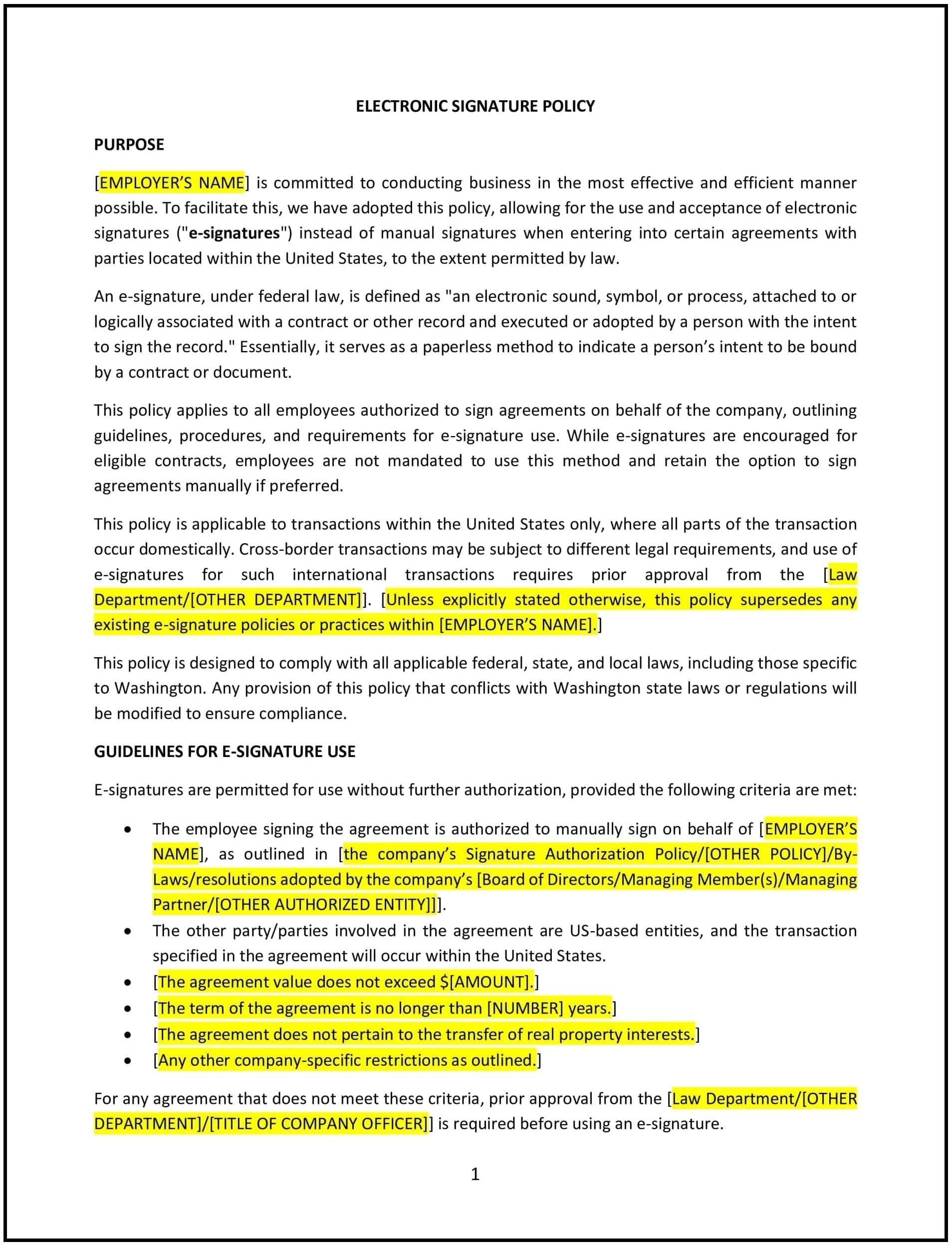Electronic signature policy (Washington): Free template
Got contracts to review? While you're here for policies, let Cobrief make contract review effortless—start your free review now.

Customize this template for free
This electronic signature policy is designed to help Washington businesses implement the use of electronic signatures for contracts, agreements, and other legal documents. The policy outlines the company’s guidelines for accepting and utilizing electronic signatures, ensuring that they are legally valid and secure. It provides the procedures for how electronic signatures should be collected, stored, and verified, helping the company comply with Washington state laws and federal regulations, including the ESIGN Act and UETA (Uniform Electronic Transactions Act).
By adopting this policy, businesses can streamline their document-signing process, improve efficiency, and reduce the costs associated with printing, mailing, and storing physical documents.
How to use this electronic signature policy (Washington)
- Define the scope of the policy: Clearly outline which types of documents and transactions are eligible for electronic signatures. This could include contracts, agreements, forms, and any other legal documents that the company routinely uses. Specify if there are any exceptions, such as documents that require physical signatures by law.
- Establish the method of electronic signature: The policy should define the methods or platforms that employees and customers will use to sign documents electronically. This may include using third-party electronic signature services (e.g., DocuSign, Adobe Sign) or custom systems the company has implemented.
- Address legal validity and compliance: The policy should clarify that electronic signatures are legally valid and enforceable under Washington state laws and federal regulations. Reference the ESIGN Act and UETA, which recognize the legal validity of electronic signatures for most business transactions.
- Set security and authentication requirements: The policy should include guidelines for ensuring the security of electronic signatures, such as multi-factor authentication, encryption, and identity verification to prevent fraud and unauthorized access.
- Outline record-keeping and storage procedures: Establish procedures for storing electronic documents and signatures securely. The policy should specify how long signed documents must be retained and how they should be stored, whether electronically in secure cloud storage or in physical archives.
- Address disputes and challenges to electronic signatures: Include procedures for addressing any disputes regarding the validity or authenticity of electronic signatures. This may involve auditing the signing process, reviewing timestamps, and ensuring that proper authentication methods were used.
- Promote compliance with Washington and federal laws: The policy should promote compliance with applicable laws and regulations regarding electronic signatures. This includes Washington state laws governing electronic transactions, as well as federal laws like the ESIGN Act.
- Review and update regularly: Periodically review and update the policy to ensure it remains compliant with changes in Washington state laws, federal regulations, or technological advancements in electronic signature systems.
Benefits of using this electronic signature policy (Washington)
This policy offers several benefits for Washington businesses:
- Increases efficiency: By using electronic signatures, businesses can speed up the document-signing process, reduce delays caused by physical mail, and facilitate quicker turnaround times on contracts and agreements.
- Reduces costs: Eliminating the need for paper, ink, postage, and physical storage for signed documents helps businesses cut costs associated with document management.
- Improves document security: Electronic signatures are more secure than traditional paper signatures because they can include encryption, audit trails, and identity verification to ensure the authenticity of the signature and prevent fraud.
- Supports legal compliance: The policy supports the business comply with Washington state and federal regulations, including the ESIGN Act and UETA, which establish the legal validity of electronic signatures.
- Enhances environmental sustainability: Reducing the need for paper documents helps businesses reduce their environmental footprint, aligning with sustainability goals and reducing waste.
- Increases convenience and accessibility: Electronic signatures can be signed from any location with internet access, making it easier for remote employees, clients, and partners to execute documents without being physically present.
Tips for using this electronic signature policy (Washington)
- Communicate the policy clearly: Ensure all employees understand the electronic signature policy and how to use the designated systems for signing documents. Include the policy in the employee handbook and provide training as needed.
- Use trusted electronic signature platforms: Choose reliable and secure electronic signature platforms that comply with legal requirements and provide a secure, encrypted environment for signing documents.
- Monitor compliance: Regularly audit the use of electronic signatures to ensure that the process is being followed correctly and that all signatures are properly authenticated.
- Maintain secure storage: Store electronic documents and signatures securely in accordance with the policy’s guidelines for record-keeping and data protection. Ensure that documents are easily retrievable if needed for legal or business purposes.
- Regularly review the policy: Periodically review the policy to ensure it remains compliant with Washington state laws, federal regulations, and any changes in technology or company operations. Regular updates will keep the policy effective and relevant.